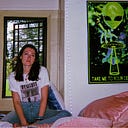Yeezus is a Timeless Masterpiece
Kanye West positioned himself as a polarizing icon in mainstream media the moment he entered the music industry in the late 1990s; he’s managed to hold the twenty-first century’s eyes captive throughout his career. To some, he is a genius, a messiah of music whose talents stretch to all corners of the Earth, a revolutionary rapper whose impact on the genre has been unforgettable; to others, he is an egotistical joke, a wannabe president roped into the Kardashian clan in pursuit of attention, a perpetrator of promoting ignorance and Trump-ism. Yet in his decades-long career, Kanye’s most notable, most impactful, and most incredulous moment dates back to 2013: the release of Yeezus.
A tidal wave of successful album rollouts had already placed Kanye at the top of the game in the years before Yeezus. The release of Cruel Summer, where a team of G.O.O.D Music signees along with their label head reached number two on the Billboard 200; Watch the Throne, which saw Jay-Z and Kanye link up to create some of the most popular songs of the year; and the instant classic: My Beautiful Dark Twisted Fantasy. The Kanyeverse remained an unpredictable, dynamic world that produced radio smashes, cult deep-cut classics, and party hits for, at the time, almost decades. His career had proved one of the most successful commercial and critical of the past two decades regardless of his public perception.
Enter May of 2013. Kanye West ominously tweets “June Eighteen.” Two weeks later, he performs “New Slaves” and “Black Skinhead” on Saturday Night Live. Clips of a video for “New Slaves” project onto sixty-six buildings scattered throughout the world. June rolls around and like the Immaculate Conception, Yeezus, Kanye West’s sixth studio album, is born unto the world.
Yeezus is an eclectic collection of sounds. A gnashing piece of music with a mind of its own. It is an album from the 3010s released in the 2010s. The album received overwhelming critical acclaim and, yet, was simultaneously regarded as a “musical and commercial suicide” in an article from The Atlantic. It was controversial just like its creator. In a departure from his original sound, and the conglomerate of influences that shaped MBDTF, Kanye West embarked on a career risk. The reward came from the audience that viewed him as a musical Christ among mere men, the same audience that produced the icon Yeezus Christ himself. Yeezus inevitably topped several music publications’ year-end lists for 2013 before earning placements on “Best Of” lists of not only the decade, but also all time.
Yeezus earned these accolades the moment the album begins. The synthy, warped opening bars of “On Sight” walks the listener down a red carpet and into a spaceship whose doors open with a triumphant: “Yeezy season approaching, fuck whatever y’all been hearing.” Kanye West has never been an unrealized artist, but a different Kanye, a figure better known as Yeezus, rose from the grave in these thirty seconds. The shameless cockiness of the album fluffs the proverbial feathers of a Kanye West still riding the wave of one of many career peaks. “I Am a God” blends a menage of screams over heavy, clashing drum patterns. Kanye’s ego shines in its rawest light through his self-serving bars. “In a French ass restaurant, hurry up with my damn croissants,” he raps before a warped, demonic voice repeats “I am a God” alongside West quite literally screaming. It ultimately concludes in a soulful harmony. The song is a four-minute emotional rollercoaster not unlike the vibrating, synthy “Hold My Liquor.” Yeezus is a chaotic conglomerate of manic sound, concluded with the crooning “Bound 2.” The music video, one of only two released during this album cycle, featured Kanye and then-new wife Kim Kardashian atop a motorcycle on an endless, passionate ride. West’s rapping “Maybe we could still make it to the church steps” reads as a retrospective curse for a superstar couple that have finally reached their clunky end after ruling the better half of the decade.
If a time machine falls into my lap, it will be solely to hear Yeezus for the first time again. I want to hear the screeches and scratches of “Hold My Liquor,” the thunderous drums of “Black Skinhead,” the soulful harmonies of “Bound 2.” All of it. Every drum, every hi-hat, every auto-tuned vocal. The LP is a sonic trip to the future, something ahead of its time. It is invigorating, the production loops in the brain for hours upon hours after listening. It’s pre- and post-industrial hip-hop, jazzy yet robotic, haunting and melodic. A musical microcosm exists within Yeezus’ forty minutes and one second.
A collection of bangers does not excuse Kanye West from criticism; his controversial actions and statements over the past few years have been embarrassing at best and despicable at worst. The artist himself may be crashing down from his apex, but Yeezus as an entity of its own sits atop a shining tower of well-deserved success and acclaim. West proverbially raps on “New Slaves:” “You see it’s leaders and it’s followers/ But I’d rather be a dick than a swallower,” and Yeezus is no follower.
